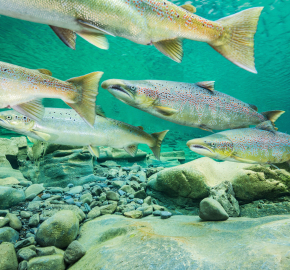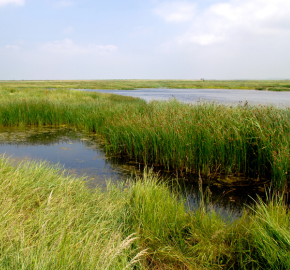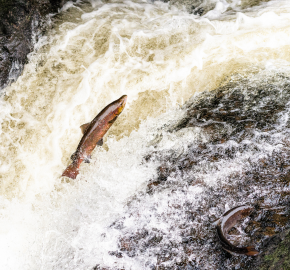The impact of unprecedented global temperatures on wild fish

Oceans are the hottest they have ever been recorded and warming faster than predicted. In this blog, our campaign researcher Danny explores the impact of these rising temperatures on wild fish including the migratory Atlantic salmon, now endangered in UK waters.
May 2024 was officially the hottest in recorded history, confirmed by Copernicus, the EU’s Earth satellite monitoring service.
This marks the twelfth consecutive month being the warmest respective month of the year. Globally, the last 12 months (May 2023-April 2024) were warmer than any previous 12-month period, at 0.73°C above the 1991-2020 average and 1.61°C above the pre-industrial average.
Such a long series of temperature records being broken is highly unusual but not unprecedented. In 2015/2016 a similar series of record-breaking months occurred, lasting 15 months in total.
What is unprecedented is the scale of warming compared to pre-industrial levels. In the last 12 months, 11 (July 2023 – May 2024) saw monthly global temperatures exceed 1.5°C above the pre-industrial level. While a few months in 2015, 2016, and 2020 also reached this 1.5°C threshold, the current 12-month streak is by far the longest to date.
Global surface temperature records monitored across both the land and sea were 1.3°C higher than the 1901-2000 average.
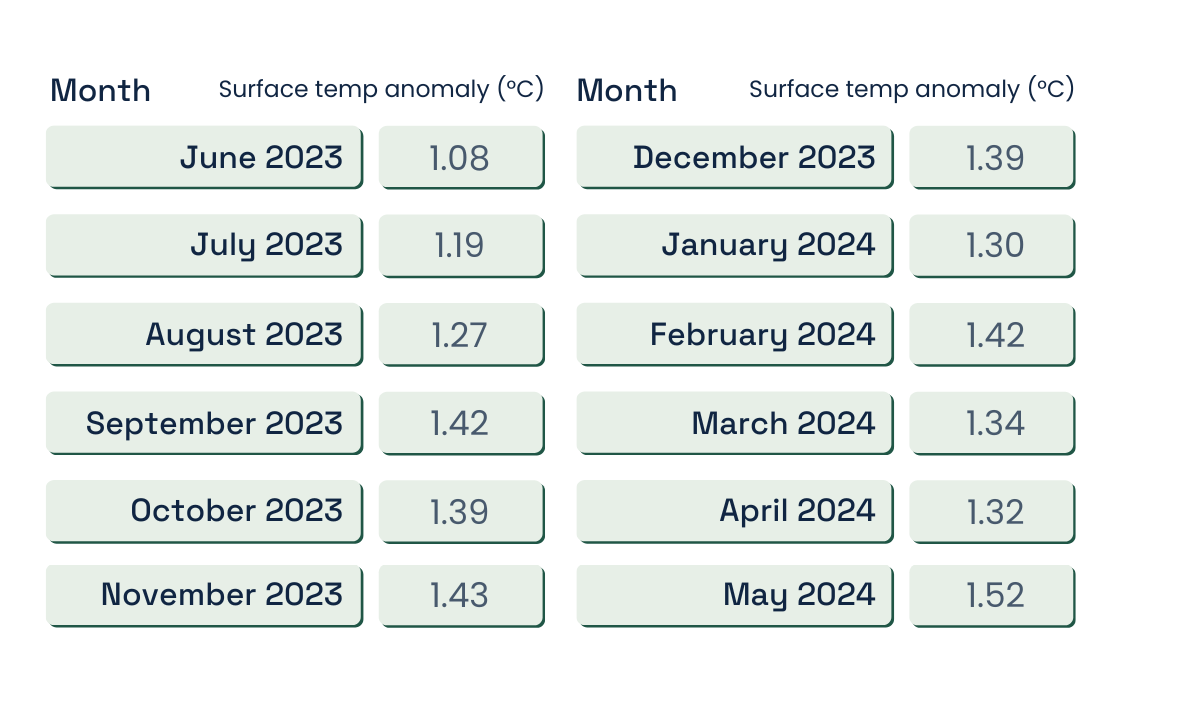
Table 1: Surface temperature anomalies (°C) by month for the past year. Data taken from the National Oceanic and Atmospheric Administration (NOAA).
Oceans are the warmest they’ve been in recorded history
Temperature records are an average taken across both land and sea surface temperatures. Measuring only land surface temperatures, January, February and March 2024 were not the hottest on record, falling short of the records set previously in 2016. When taking into account sea surface temperatures the data is more worrying.
Global average sea surface temperature anomalies are already on a 14 month record breaking streak. Further still, every single day from May 4 2023 to May 4 2024 broke corresponding daily sea surface temperature records. In some cases, the margin between this and the previous record was huge (over 0.3°C), with the top three being 3 August 2023, 3 January 2024 and 5 January 2024 (around 0.34°C).
Closer to home in the North Atlantic, temperature records were broken for an astonishing 421 days straight up until May this year.
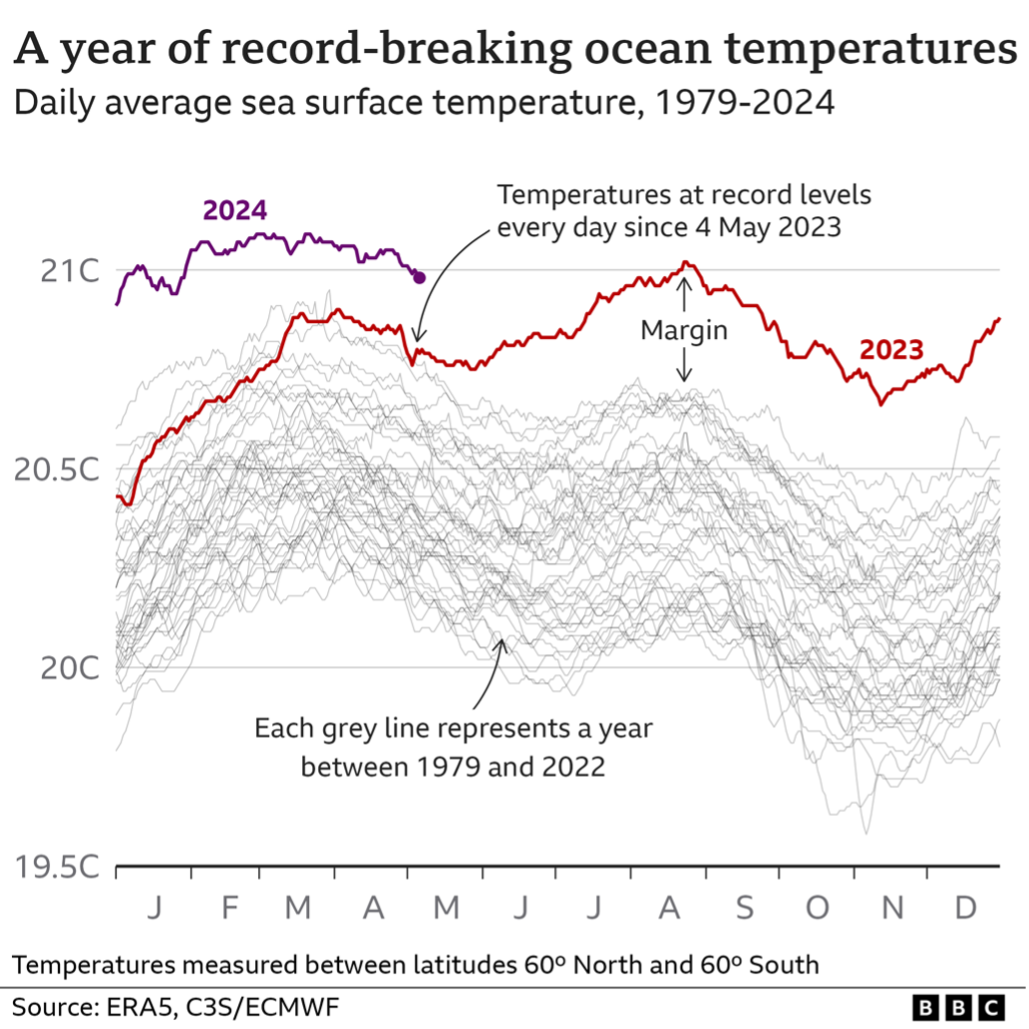
Figure 1: Daily SST anomalies show every single day between May 4th 2023 and May 4th 2024 broke corresponding sea surface temprature records. Credit: BBC https://www.bbc.co.uk/news/science-environment-68921215
Oceans are warming even faster than predicted
We should all be greatly concerned by rising marine temperatures, as they have far reaching consequences both for marine life and the wider environment.
Our oceans cover more then 70% of the earth’s surface, and owing to their high heat capacity have absorbed an estimated 90% of the warming caused by increasing greenhouse gasses (NASA, 2023). It is now becoming evident that our oceans are struggling to cope with this increased burden, warming twice as fast as they were in the 1960s. This is predicted to get worse as carbon emissions continue to increase (Cheng et al., 2022).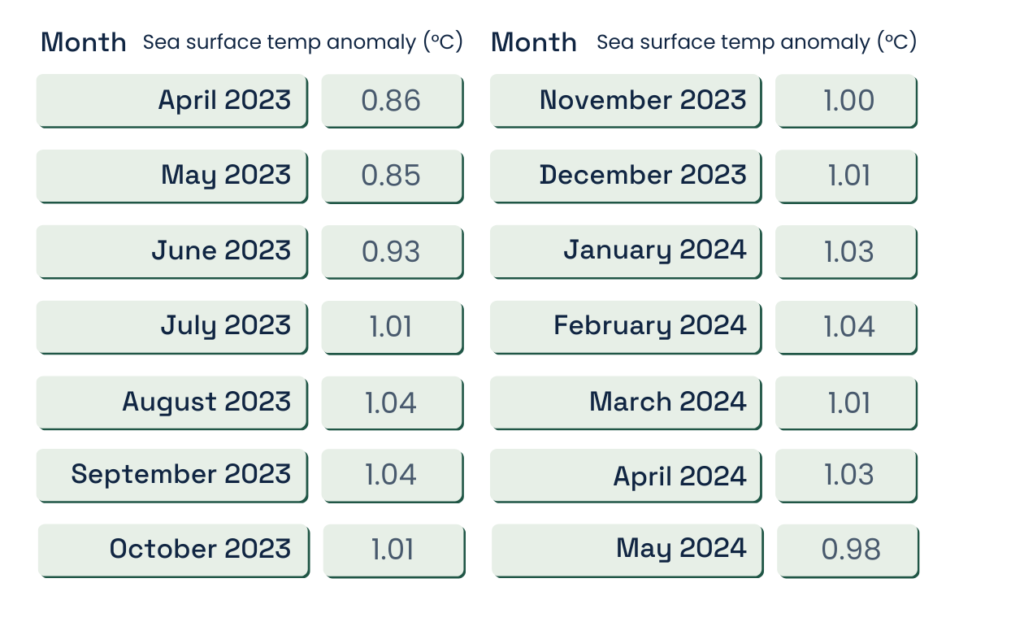
Table 2: Sea surface temperature anomalies (°C) by month for the past 14 months. Data taken from the National Oceanic and Atmospheric Administration (NOAA).
The impact of rising temperatures on wild fish
The effects of such an unusually warm North Atlantic on wild fish, especially migrating Atlantic Salmon, is not fully known. One thing however is certain, our already suffering salmonids do not need these added stresses caused by climate change.
The impacts of rising water temperatures are being demonstrated in a number of ways:
1. Shifting fish migration patterns.
Species like herring and whiting are moving towards cooler polar regions essential for spawning, while others, such as black seabream, are relocating to deeper waters (WWF, 2023). Deep-water species are also affected; the Alaska snow crab fishery collapse was partly due to heatwave conditions on the ocean floor.
2. Degradation of coastal habitats like mangrove forests and coral reefs.
The degradation of these habitats disrupts the behaviour and nutrition of resident fish species. Elevated temperatures and lower pH levels, due to increased carbon dioxide absorption, destroy the calcium carbonate structure of corals, making them more susceptible to diseases (Kong, 2023).
3. Disruption of plankton, the base of the marine food web.
Plankton suffer from higher sea temperatures that prevent nutrient mixing between deep and surface waters. This disruption affects fish species that synchronize their reproductive cycles with plankton blooms. Continued warming may see native fish species replaced by those better adapted to higher temperatures. The appearance of warm-water fish in UK waters and the decline of cold-affinity species highlight climate change effects on fish distribution (Wright et al., 2020). Changes in the timing of fish reproduction and plankton availability affect recruitment rates and population dynamics, with rising temperatures decreasing oxygen solubility and increasing metabolic costs. Now in the UK, fish are growing faster but reaching smaller adult sizes due to higher metabolic rates in warmer waters, which increase oxygen demand (Ikpewe et al., 2021).
The causes of rising ocean temperatures
The climatic phenomena known as El Niño Southern Oscillation (ENSO) has been partly to blame for these record ocean temperatures.
El Niño is a climate phenomenon characterised by the periodic warming of sea surface temperatures in the central and eastern equatorial Pacific Ocean, leading to significant weather changes globally, such as increased rainfall in some regions and droughts in others. It disrupts normal weather patterns, impacting agriculture, water resources, and ecosystems.
Due to climate warming, ENSO events are predicted to increase in their frequency and magnitude, and paleoclimate records suggest that this has happened in the past during warm periods of Earth’s history (Cai et al., 2021). The 2023-2024 ENSO was the fourth most powerful on record, and even now, despite satellite data showing that ENSO conditions have now dissipated global average sea surface temperature (SST) outside the polar regions were once again the warmest for the respective month of the year in April 2024 (Copernicus, 2024).
Alongside ENSO conditions in the past year it cannot be ignored that 2023 also saw the highest CO2 emissions on record, growing by 1.1% to 37.4 billion tonnes.
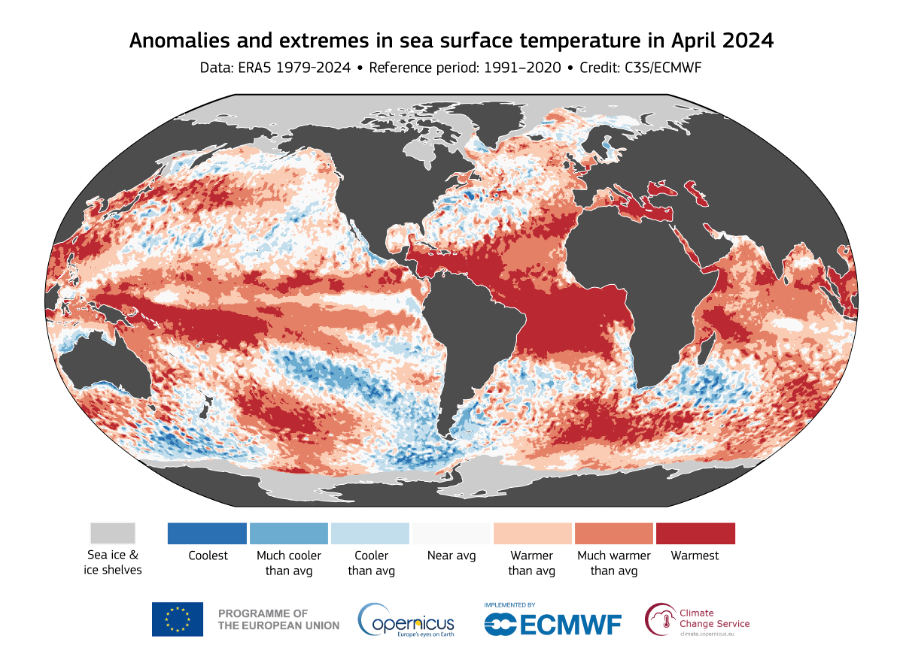
Figure 2: Anomalies and extremes in sea surface temperature in April 2024. Credit: Copernicus 2024
The future looks bleak unless urgent action is taken now
This unprecedented streak of land and ocean warming, exacerbated by increasingly occurring phenomena like El Niño shows how global warming is now having real world impacts on marine life and the environment.
More desperately needs to be done by nation states, industry and us to mitigate these impacts let alone begin to reverse them.
If urgent action is not taken, we risk losing many iconic fish species in the UK and around the world forever.
References
Cai, W., Santoso, A., Collins, M., Dewitte, B., Karamperidou, C., Kug, J.-S., Lengaigne, M., McPhaden, M. J., Stuecker, M. F., Taschetto, A. S., Timmermann, A., Wu, L., Yeh, S.-W., Wang, G., Ng, B., Jia, F., Yang, Y., Ying, J., Zheng, X.-T., … Zhong, W. (2021). Changing El Niño–Southern Oscillation in a warming climate. Nature Reviews Earth & Environment, 2(9), 628–644. https://doi.org/10.1038/s43017-021-00199-z
Cheng, L., von Schuckmann, K., Abraham, J. P., Trenberth, K. E., Mann, M. E., Zanna, L., England, M. H., Zika, J. D., Fasullo, J. T., Yu, Y., Pan, Y., Zhu, J., Newsom, E. R., Bronselaer, B., & Lin, X. (2022). Past and future ocean warming. Nature Reviews Earth & Environment, 3(11), 776–794. https://doi.org/10.1038/s43017-022-00345-1
Copernicus. (2024). April 2024 – 11th consecutive warmest month globally. Monthly Climate Bulletin. https://climate.copernicus.eu/april-2024-11th-consecutive-warmest-month-globally
Ikpewe, I. E., Baudron, A. R., Ponchon, A., & Fernandes, P. G. (2021). Bigger juveniles and smaller adults: Changes in fish size correlate with warming seas. Journal of Applied Ecology, 58(4), 847–856. https://doi.org/10.1111/1365-2664.13807
NASA. (2023). Ocean Heat Content | NASA Global Climate Change. Climate Change: Vital Signs of the Planet. https://climate.nasa.gov/vital-signs/ocean-warming?intent=121
Wright, P., Pinnegar, J. K., & Fox, C. (2020). Impacts of climate change on fish, relevant to the coastal and marine environment around the UK.
WWF. (2023). What record-high ocean temperatures could mean for marine life and people. World Wildlife Fund. https://www.worldwildlife.org/stories/what-record-high-ocean-temperatures-could-mean-for-marine-life-and-people


